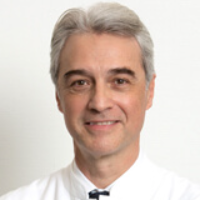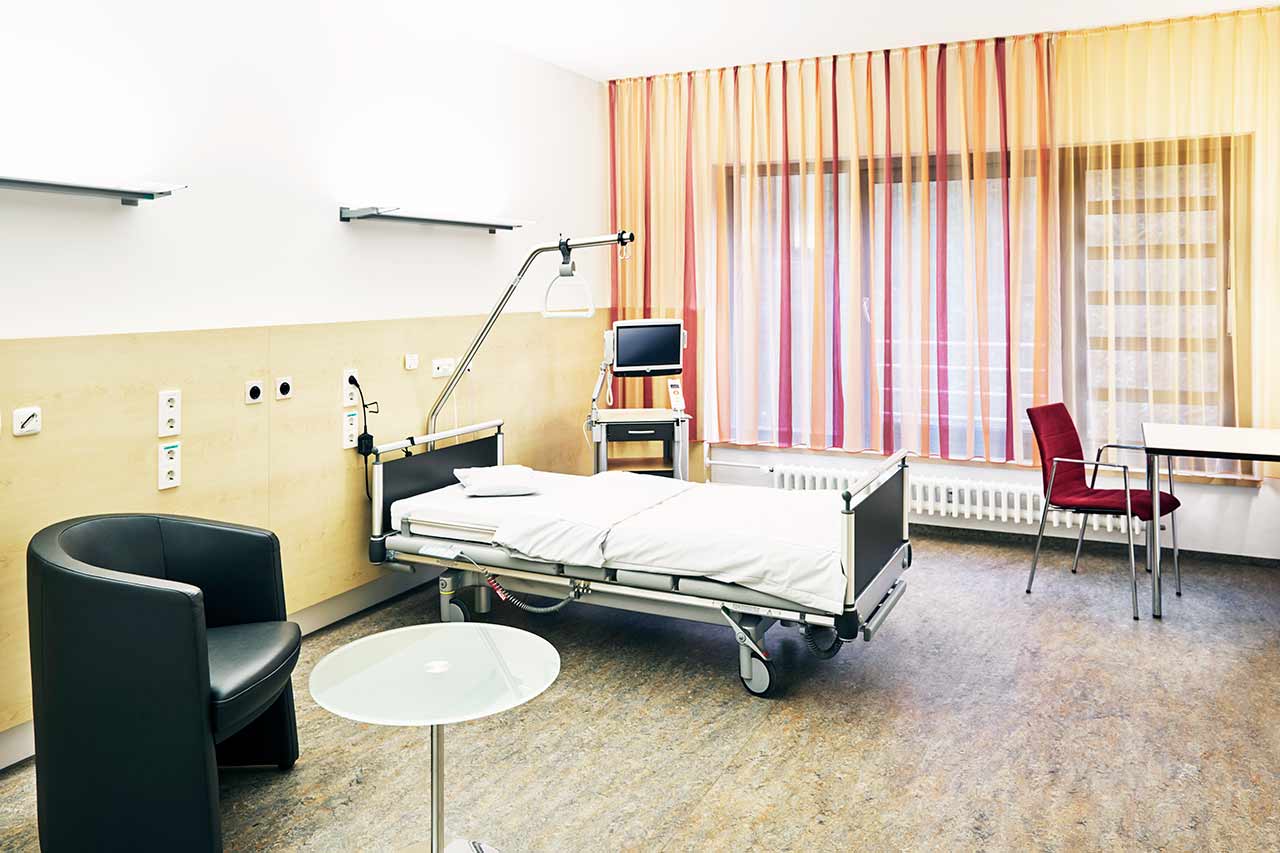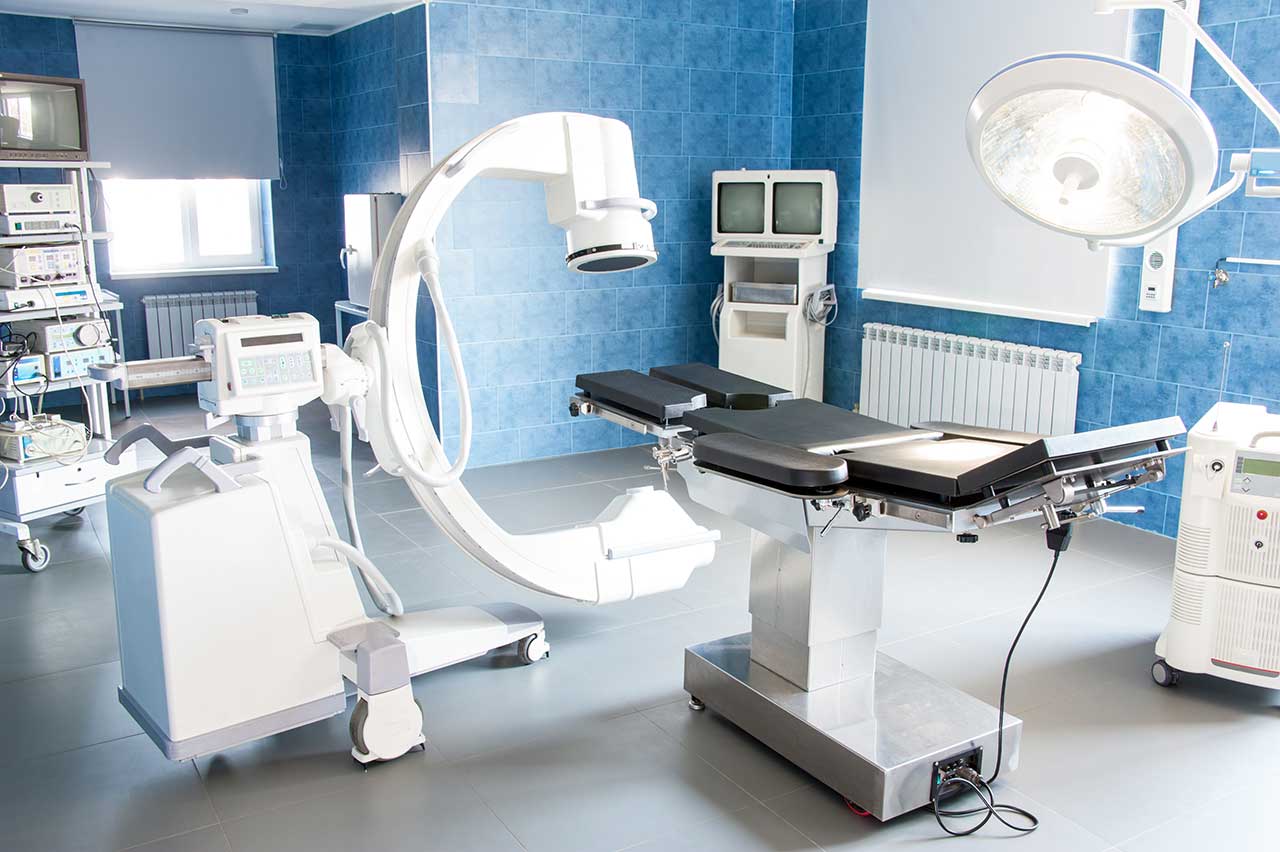
The program includes:
- Initial presentation in the clinic
- clinical history taking
- physical examination
- laboratory tests:
- complete blood count
- biochemical analysis of blood
- TSH-basal
- tumor markers
- inflammation indicators
- indicators blood coagulation
- ultrasound of the abdomen
- CT/MRI scan of the abdomen
- colonoscopy with biopsy
- preoperative care
- laparoscopic resection of affected parts of the intestine
- histological and Immunhistochemiсal analysis
- consultation on nutrition
- symptomatic treatment
- control examinations
- cost of essential medicines and materials
- nursing services
- full hospital accommodation
- explanation of future recommendations
Required documents
- Medical records
- Esophagogastroduodenoscopy (EGD), MRI/CT scan (not older than 3 months)
- Biopsy results (if available)
Service
You may also book:
 BookingHealth Price from:
BookingHealth Price from:
About the department
The Department of General and Abdominal Surgery, Colorectal Surgery, Endocrine Surgery and Hernia Surgery at the Marien Hospital Duesseldorf offers the full range of modern surgical interventions in the areas of its specialization. Every year, the medical facility performs more than 2,500 surgical interventions on an inpatient and outpatient basis. The department has vast clinical experience in the field of minimally invasive surgery, which allows the patient to avoid severe pain and prolonged hospitalization. In addition, the department offers robotic surgery using the most modern models of the da Vinci surgical system. The medical facility has the status of the Reference Center for Minimally Invasive Surgery and Hernia Surgery. Surgical treatment of cancer is one of the department's clinical priority focuses. A large number of da Vinci robot-assisted interventions are performed here for gastrointestinal cancers. The department holds a leading position in the use of the da Vinci surgical system in the treatment of rectal and sigmoid cancer patients. The operating rooms of the medical facility are equipped with the very latest technology, while hygiene and safety standards are at the highest level as well. Prior to surgery, the patient undergoes a comprehensive examination. Doctors also assess the risks of the upcoming operation and its expected results. With appropriate clinical indications, preference is always given to minimally invasive surgery. The Head Physician of the department is Dr. med. Konstantinos Zarras.
As a rule, surgical intervention is the last-line therapy when conservative methods do not provide the desired result and cannot restore the patient's health as much as possible. Prior to any operation, the department's surgeon studies the patient's medical history and previously obtained diagnostic results, as well as prescribes the necessary additional tests to assess his general health and the risks of surgical treatment. Prior to the prescription of the operation, the surgeon holds an individual consultation with the patient, during which he talks about the course of the upcoming operation, surgical access, duration of the intervention, type of anesthesia, expected results and recovery period after the intervention. The department also successfully performs emergency surgical interventions (24 hours a day). It is worth noting that most surgical interventions are performed using sparing laparoscopic techniques. Depending on the particular clinical indications, operations can be performed under both local and general anesthesia. In addition, the department uses special programs for the accelerated recovery of patients' health after surgical treatment.
General and abdominal surgery is focused on various operations for gastrointestinal diseases. One of the primary areas of work of the department's team of surgeons is the treatment of benign and malignant tumors of the bowel and rectum, stomach, pancreas and other abdominal organs. Oncologists, interventional radiologists, radiation therapists and other doctors of related medical specialties are also engaged in the therapeutic process. Every week, the department holds interdisciplinary boards, during which each clinical case is considered in detail and an optimal treatment regimen is developed. Prior to surgery, the patient quite often undergoes neoadjuvant chemotherapy and/or radiation therapy to shrink the tumor before its subsequent resection. The specialists of the medical facility strictly follow the recommendations of professional societies and comply with modern clinical protocols, due to which high treatment success rates are achieved.
The department is one of the leading medical facilities in Germany, where sparing interventions for cancers of the abdominal organs are successfully performed using the da Vinci surgical system. The number of robotic surgical procedures performed here for rectal and sigmoid cancer is one of the highest in all of Germany.
The da Vinci system consists of two main blocks: a robot with four manipulator arms equipped with cameras and special surgical instruments, and a control console for the operating surgeon. During the intervention, a specialist sits at the console, which displays an image of the surgical field in multiple zooms on its screen. It is the surgeon who sets the commands to the robotic system, which executes them with the highest accuracy. Operations using the da Vinci robotic system are performed through several small skin punctures or incisions, the size of which does not exceed 1-2 cm. This contributes to low surgical risks and rapid recovery after surgical treatment. In addition, the range of motion of the manipulator arms of the da Vinci system exceeds that of the human hand, making surgical manipulations more precise. Following da Vinci robotic surgeries, patients recover in the shortest possible time and have almost no complications during or after the intervention. In addition, such interventions provide minimal pain in the postoperative period and good aesthetic outcomes.
The department's surgical options are complemented by the treatment of endocrine disorders. Particular attention is paid to the treatment of thyroid and parathyroid pathologies. The specialists are also competent in the provision of medical care to patients with pancreatitis, adrenal diseases and neuroendocrine tumors. When performing endocrine interventions, doctors use innovative neuromonitoring systems to control the condition of the vocal cords. Whenever possible, low traumatic surgical techniques are used, after which a long recovery is not required.
The team of colorectal surgeons of the medical facility performs surgical treatment of inflammatory bowel disease (Crohn's disease and ulcerative colitis), anal fistulas, abscesses and fissures, rectal prolapse, anal tumors, hemorrhoids and other pathologies. Complex clinical cases require classical open surgery, but most often, the specialists can achieve the desired result using minimally invasive techniques.
The department also specializes in hernia surgery: inguinal and umbilical hernias, epigastric hernias, diaphragmatic and incisional hernias. All surgical procedures for hernia repair are performed using minimally invasive techniques, so the patient's recovery takes place as soon as possible. It should be noted that the department has the status of the Reference Center for Hernia Surgery, which indicates the high competence of doctors in this field and the highest quality of treatment.
The department's range of medical services includes:
- General and abdominal surgery
- Surgical treatment of benign diseases
- Gastroesophageal reflux disease
- Achalasia cardia
- Bile duct stones and cholecystitis
- Spleen diseases
- Appendicitis
- Inflammatory bowel disease (for example, diverticulitis)
- Benign gastrointestinal tumors
- Surgical treatment of malignant diseases
- Esophageal cancer
- Stomach cancer
- Duodenal cancer
- Small intestine and rectal cancer
- Pancreatic cancer
- Liver and biliary tract cancer
- Sarcomas (soft tissue tumors)
- Gastrointestinal stromal tumors
- Liver and lung metastases caused by gastrointestinal cancer
- Abdominal cancer surgery using the da Vinci surgical system
- Surgery for rectal cancer
- Surgery for sigmoid cancer
- Surgery for other malignant tumors of the abdominal cavity
- Surgical treatment of benign diseases
- Colorectal surgery
- Anal abscesses
- Anal fissures and fistulas
- Hemorrhoidal anal skin tags
- Anal tumors
- Ulcerative colitis and Crohn's disease
- Haemorrhoids
- Chronic constipation
- Anal cancer
- Rectal cancer
- Endocrine surgery
- Thyroid diseases
- Parathyroid diseases
- Adrenal diseases
- Pancreatitis
- Neuroendocrine tumors
- Hernia surgery
- Inguinal hernias
- Umbilical hernias
- Epigastric hernias
- Diaphragmatic hernias
- Incisional hernias
- Other surgical options
Curriculum vitae
Professional Career
- Since 1 July 2012 Head Physician of the General and Abdominal Surgery, Colorectal Surgery, Endocrine Surgery and Hernia Surgery at the Marien Hospital Duesseldorf.
- Since 1 April 2005 Head Physician of the Department of General and Abdominal Surgery, Trauma Surgery at the St. Vincent’s Hospital Duesseldorf.
- Since 1 February 2004 Head of the Department of Surgery in the Interdisciplinary Abdominal Surgery Center at the Marien Hospital Duesseldorf.
- Since 1 June 2003 Senior Physician of the Department of Surgery at the University Hospital of the Ruhr University in Bochum, Marien Hospital Duesseldorf.
- Since 1 September 1999 Senior Physician of the Department of Surgery at the Marien Hospital Duesseldorf.
- Since 2 June 1994 Assistant Physician in the Department of Surgery at the Marien Hospital Duesseldorf.
- Since 2 December 1992 Intern in the Department of Surgery at the Marien Hospital Duesseldorf.
Photo of the doctor: (c) Marien Hospital Düsseldorf
About hospital
The Marien Hospital Duesseldorf is a modern medical facility in the very center of Duesseldorf and a recognized Research Center. The foundation stone of the hospital was laid back in 1864 with the support of the Catholic Church. The Christian principles of helping and supporting patients have not changed at all over the years, but the level of medical care has become fundamentally different: a small hospital has been transformed into a multidisciplinary medical center with 11 internal departments, institutes and 7 interdisciplinary centers. Thus, patients can receive a comprehensive diagnostic examination and treatment under one roof. The medical facility is an academic hospital, so patients have access to innovative achievements in the field of modern medicine and receive the most effective treatment.
The hospital has 437 beds for inpatient treatment. It provides first-class medical services to 63,000 patients every year. The doctors and nursing staff of the hospital strive to provide each patient with customized treatment, taking into account their wishes and needs. In addition to providing top-class medical care, the specialists pay attention to the humane attitude towards patients and their life situation. Doctors devote enough time to personal communication with patients and support them in every possible way on their path to recovery.
The team of the hospital consists of competent doctors who are the best professionals in their medical field. They all work in interdisciplinary cooperation. In their clinical practice, doctors use state-of-the-art equipment, the very latest technologies, as well as innovative treatment methods, which in combination allows achieving optimal treatment outcomes.
Photo: (с) depositphotos
Accommodation in hospital
Patients rooms
The patients of the Marien Hospital Duesseldorf live in comfortable patient rooms equipped with everything necessary. The room furnishing includes a comfortable bed with an orthopedic mattress, a bedside table, a wardrobe, a table, chairs, and a TV. The rooms are designed in light colors so that patients feel comfortable here. Each patient room also has an ensuite bathroom with shower and toilet.
Meals and Menus
The patients of the hospital are offered a healthy and balanced three meals a day: buffet breakfast, lunch and dinner. The menu also includes dietary and vegetarian dishes.
If for some reason you do not eat all the foods, you will be offered an individual menu. Please inform the medical staff about your food preferences prior to treatment.
Further details
Standard rooms include:
Religion
Religious services are available upon request.
Accompanying person
Your accompanying person may stay with you in your patient room or at the hotel of your choice during the inpatient program.
Hotel
You may stay at the hotel of your choice during the outpatient program. Our managers will support you for selecting the best option.





